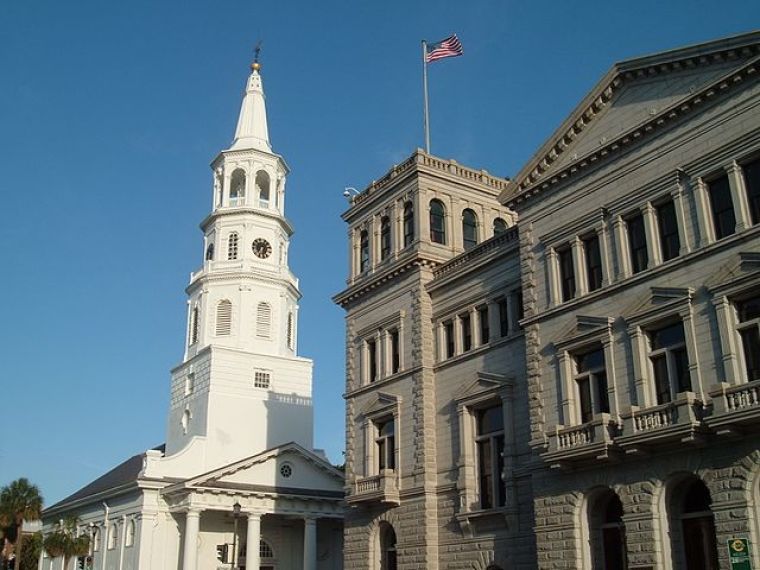South Carolina high court orders breakaway Anglicans to return 29 parishes to Episcopal Church

The South Carolina Supreme Court has ordered a diocese that broke away from the Episcopal Church in 2012 to return 29 properties that were valued at about $500 million.
On Wednesday, the high court ruled that the Diocese of South Carolina, which is now part of the Anglican Church in North America (ACNA), must return the 29 church properties to the Episcopal Church. However, the majority of justices decided that seven parishes and a land trust that broke away can hold on to their properties as they never agreed in writing to let the national church hold them in trust, unlike the others, The Post and Courier reported.
Among the properties that are set to be returned to The Episcopal Church are St. Michael's Church, the oldest surviving religious building in the city, and St. Philip's Church, which is the oldest congregation in the state.
About two-thirds of the parishes in the Diocese of South Carolina left the Episcopal Church in 2012, following years of bitter argument over issues ranging from scriptural interpretations to governance powers to gay rights. The diocese has since joined the ACNA, which was formed in 2009 as an alternative to the Episcopal Church.
A 2015 ruling by a lower court had granted the conservative Anglicans "all their property, including churches, symbols, and other assets" worth $500 million. That same year, the Episcopal Church tried to settle the dispute by letting the Anglicans keep their physical properties in return for giving up their intellectual property, but the breakaway diocese refused.
On Wednesday, the Supreme Court ruled 3–2 to reverse the 2015 decision, and it ruled 2–2, with one abstention, to uphold the lower court ruling on the breakaway diocese's intellectual property claims, allowing it to continue to use its name, seal, and symbols.
According to Christianity Today, the high court decision was hinged on the Dennis Canon, an Episcopal church law granting ownership of parish property to the local diocese and the national church. The justices determined that even after the diocese had left the denomination, only churches that had not "acceded" to the Dennis Canon had the rights to the property.
Rev. Jim Lewis, a spokesman for the Diocese of South Carolina, said that attorneys are still reviewing the complicated series of opinions. The diocese has expressed its intention to seek a rehearing by the high court.
"It's fair to say we were disappointed in the ruling as it has come down," Lewis said. "But it's something we are still studying because it's complicated," he added.
Bishop Skip Adams of The Episcopal Church in South Carolina said in an email to parishioners that he was grateful for the decision, but he noted that the breakaway diocese could still file an appeal.
"It is important to note that the legal system allows for periods of judicial review and possible appeal, so it will be some time before we can say with certainty what the journey ahead will look like," Adams wrote, adding that the church's ultimate goal is "reconciliation and unity."
 Christians don't have to affirm transgenderism, but they can’t express that view at work: tribunal
Christians don't have to affirm transgenderism, but they can’t express that view at work: tribunal Archaeology discovery: Medieval Christian prayer beads found on Holy Island
Archaeology discovery: Medieval Christian prayer beads found on Holy Island Presbyterian Church in America votes to leave National Association of Evangelicals
Presbyterian Church in America votes to leave National Association of Evangelicals Over 50 killed in 'vile and satanic' attack at Nigerian church on Pentecost Sunday
Over 50 killed in 'vile and satanic' attack at Nigerian church on Pentecost Sunday Ukrainian Orthodox Church severs ties with Moscow over Patriarch Kirill's support for Putin's war
Ukrainian Orthodox Church severs ties with Moscow over Patriarch Kirill's support for Putin's war Islamic State kills 20 Nigerian Christians as revenge for US airstrike
Islamic State kills 20 Nigerian Christians as revenge for US airstrike Man who served 33 years in prison for murder leads inmates to Christ
Man who served 33 years in prison for murder leads inmates to Christ


 Nigerian student beaten to death, body burned over ‘blasphemous’ WhatsApp message
Nigerian student beaten to death, body burned over ‘blasphemous’ WhatsApp message 'A new low': World reacts after Hong Kong arrests 90-year-old Cardinal Joseph Zen
'A new low': World reacts after Hong Kong arrests 90-year-old Cardinal Joseph Zen Iran sentences Christian man to 10 years in prison for hosting house church worship gathering
Iran sentences Christian man to 10 years in prison for hosting house church worship gathering French Guyana: Pastor shot dead, church set on fire after meeting delegation of Evangelicals
French Guyana: Pastor shot dead, church set on fire after meeting delegation of Evangelicals ‘Talking Jesus’ report finds only 6% of UK adults identify as practicing Christians
‘Talking Jesus’ report finds only 6% of UK adults identify as practicing Christians Mission Eurasia ministry center blown up in Ukraine, hundreds of Bibles destroyed: 'God will provide'
Mission Eurasia ministry center blown up in Ukraine, hundreds of Bibles destroyed: 'God will provide' Church holds service for first time after ISIS desecrated it 8 years ago
Church holds service for first time after ISIS desecrated it 8 years ago Burger King apologizes for 'offensive campaign' using Jesus' words at the Last Supper
Burger King apologizes for 'offensive campaign' using Jesus' words at the Last Supper Uganda: Muslims abduct teacher, burn him inside mosque for praying in Christ’s name
Uganda: Muslims abduct teacher, burn him inside mosque for praying in Christ’s name